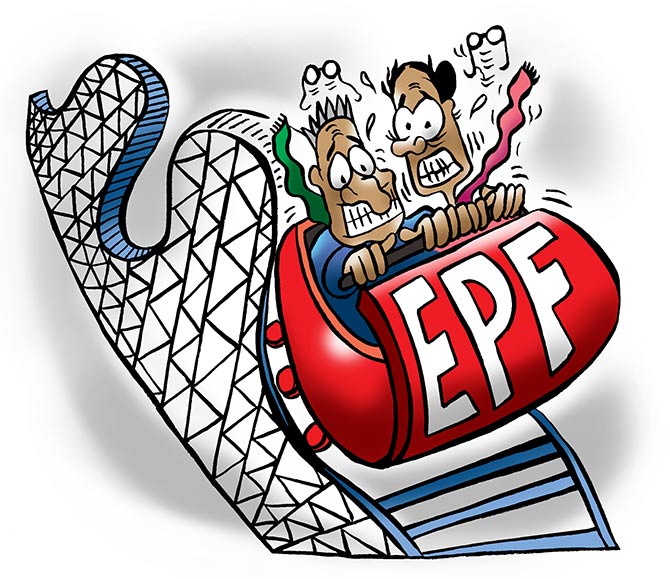 | « Back to article | Print this article |
The government has found about 900,000 beneficiaries of its flagship job formalisation scheme, the PMRPY, were ineligible in the first place as they were part of the formal economy even before the inception of the scheme.
The EPFO has also recovered Rs 222 crore so far from the employers concerned.

About 80,000 companies have been found duping the system by taking financial incentives worth Rs 300 crore from the central government for a scheme meant to create new jobs in the formal sector.
The government has found about 900,000 beneficiaries of its flagship job formalisation scheme, the Pradhan Mantri Rojgar Protsahan Yojana (PMRPY), were ineligible in the first place as they were part of the formal economy even before the inception of the scheme.
The provident fund accounts of these employees have been blocked by the Employees’ Provident Fund Organisation (EPFO).
The EPFO has also recovered Rs 222 crore so far from the employers concerned, according to the documents reviewed by Business Standard, which give details about the fraudulent practice.
Queries sent to Labour and Employment Secretary Heeralal Samariya and EPFO’s Central Provident Fund Commissioner Sunil Barthwal remained unanswered.
Interestingly, the EPFO's payroll database, which takes into account the PMRPY beneficiaries, is used by the government to highlight job creation in the formal sector.
In 2016, the NDA government unveiled the PMRPY to share the financial burden of firms.
The scheme, which came into being in August 2016, was meant for new employees hired by companies from April 1, 2016.
Through the PMRPY, the Centre pays the employer’s share of workers’ contribution towards the PF for three years.
The most important criterion was that firms would get support only if they hired a worker who was not part of EPFO schemes in the past.
But till July 16, 2019, 898,576 employees, belonging to 80,000 firms, were found to be those who already had an old PF account.
This was roughly 7 per cent of the 12.1 million employees who had benefitted from the scheme till then.
Documents showed that the EPFO had already recovered Rs 222 crore from employers till July 2019.
To ensure firms take benefit only for new staff, the Centre said the Universal Account Number (UAN), issued after April 1, 2016, should be linked to Aadhaar.
But here’s the catch: Linking Aadhaar with UAN became compulsory from July 2017.
New UANs were created for 898,576-odd workers.
In the case of 622,000, Aadhaar was linked to old UANs, so their accounts were blocked by the EPFO.
The EPFO then started a de-duplication exercise to find out more potential ineligible cases under the PMRPY.
The different combinations of details of workers (part of the PMRPY) were matched with the EPFO’s database.
Till July 2019, it found at least 276,472 cases that had a PF account before 2016, according to a presentation given by the EPFO to the labour and employment secretary on October 9, 2019.
The labour ministry had asked the EPFO “to undertake third-party evaluation of the scheme on an urgent basis” in October 2018.
Till November 2018, the EPFO had found over 360,000 such cases, which rose sharply to around 900,000 in a gap of eight months.
An EPFO official said the situation might have occurred due to lack of awareness among workers.
“Apart from that, in some cases, workers might have closed their PF accounts after withdrawing all the money. This led to creation of a new account unintentionally,” the official explained.
However, employers blamed lack of proper checks.
“Checks and balances should have been put in place since day one as it’s hard for employers to validate a worker’s claim that they didn’t have a PF account in the past.
"The EPFO does have tools to check for duplication,” Rituparna Chakraborty, president, Indian Staffing Federation, said.
Another executive said firms had verified details of the new employee from the EPFO database and the authorities had unnecessary demanded penalty from them.